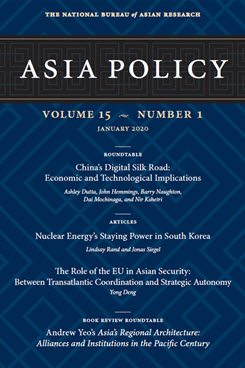Chinese Industrial Policy and the Digital Silk Road
The Case of Alibaba in Malaysia
This essay demonstrates how China’s domestic industrial policies provide important indirect support for the Digital Silk Road, as shown by Alibaba’s activities in Malaysia.
EXECUTIVE SUMMARY
MAIN ARGUMENT
In recent years, China’s domestic industrial policies have expanded dramatically. Three trends are especially important in shaping the impact of domestic policies on the Digital Silk Road. First, recent industrial policies have increasingly focused on technologies centered around artificial intelligence, 5G telecommunications, and smart networks. Second, while policies are still state-led, they rely on close partnerships with private firms such as Alibaba, Baidu, and Tencent. Third, a new wave of regional policies aims to create urban clusters that will be more efficient and less congested than regions dominated by single large cities. Each of these trends can be witnessed in the activities of Alibaba in Malaysia. Already a pioneer of smart city development in China, Alibaba has begun implementing its City Brain program in Kuala Lumpur, Malaysia, complementary to its e-commerce and logistics initiatives in Southeast Asia. While Malaysia is a front runner in these activities, similar dynamics are at work throughout the region. There are powerful complementarities created by dynamic private Chinese businesses, the large Chinese market, and the availability of finance for China-supported infrastructure programs.
POLICY IMPLICATIONS
- The U.S. and other nations committed to open standards need to recognize that a few Chinese companies, like Alibaba, have already made substantial inroads into Southeast Asia and are purveying an attractive business model.
- The U.S. and Japan need to improve the quality of their game in Southeast Asia. It cannot be presumed that a backlash will develop against Chinese government–dominated initiatives or corruption. On the contrary, attractive, concrete, low-cost alternatives must be offered to the countries, businesses, and people of Southeast Asia.
- The ultimate shape of smart infrastructure is not yet known, and the potential for heightened transparency and more responsive systems is large. Many countries, and specifically those in Southeast Asia, have an interest in open systems that increase their options and do not tie them to a single business partner. The U.S. needs to develop a comprehensive program to strengthen the open global system and provide these countries with secure access to it.
Barry Naughton is the Sokwanlok Chair of Chinese International Affairs in the School of Global Policy and Strategy at the University of California–San Diego.
About Asia Policy
Asia Policy is a peer-reviewed scholarly journal presenting policy-relevant academic research on the Asia-Pacific that draws clear and concise conclusions useful to today’s policymakers. Asia Policy is published quarterly in January, April, July, and October and accepts submissions on a rolling basis. Learn more



